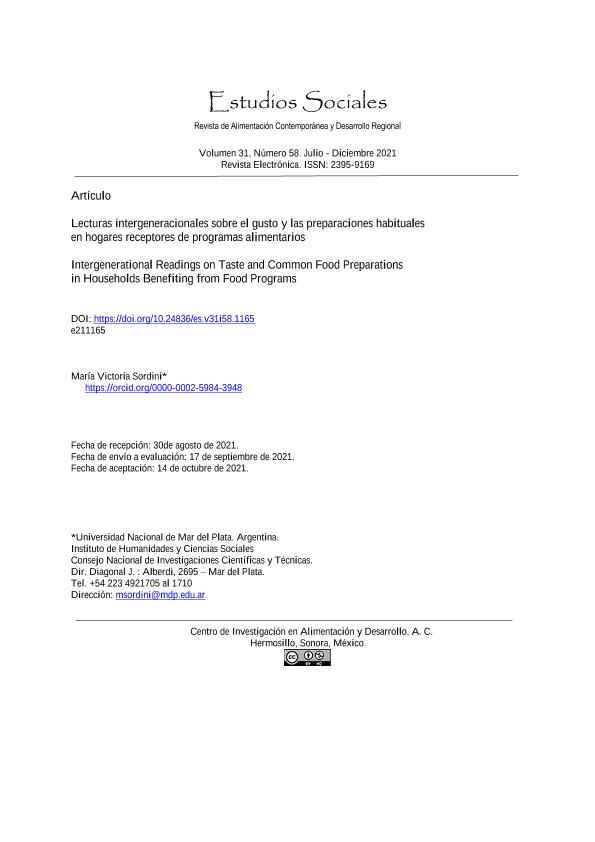Artículo
En Argentina, desde los años ochenta, el problema alimentario y las condiciones de pobreza son asistidas por múltiples programas sociales. Actualmente, ante la persistencia de las condiciones de pobreza, tres generaciones han complementado la alimentación de sus hogares con las prestaciones estatales. Objetivo: el objetivo de este artículo es observar las preparaciones que se realizan en un día habitual en los hogares que reciben programas alimentarios desde hace más de tres décadas para describir y comparar de manera intergeneracional las prácticas alimentarias de preparación y consumo de alimentos. Metodología: para ello se realizó un estudio cualitativo con el método biográfico en su modalidad relatos de vida. Con la técnica entrevista en profundidad se indagaron 45 personas entre 18 y 30 años, entre 31 y 55 y mayores de 56 años que corresponden a distintas generaciones y han recibido múltiples programas alimentarios a lo largo de sus biografías en el Partido de General Pueyrredon (PGP), provincia de Buenos Aires, Argentina. Resultados: la primera generación demuestra mayor variedad de alimentos en sus preparaciones; se destaca una perdida en el uso de las verduras en la tercera y segunda generación. La preparación más eficiente es el guiso por su versatilidad en el rendimiento para múltiples comensales o comidas. La tercera generación realiza preparaciones con menor variedad de nutrientes y le asigna a sus comidas el atributo de poderosas. Limitaciones: no se trata de un estudio que analiza la ingesta alimentaria para comparar con las recomendaciones nutricionales, sino que, desde un análisis sociológico, se indagaron las preparaciones habituales, las percepciones en torno a la comida, el acceso a los alimentos. Conclusiones: si bien el gusto se configura por las condiciones de necesidad, también emergen grados de libertad como intersticios en los que se cuelan sabores, saberes culinarios, tradiciones, costumbres, patrones alimentarios y legados intergeneracionales cargados de sentidos y significados. Since the 1980s, in Argentina, food problems and poverty conditions have been assisted by multiple food programs. Currently, three generations have complemented their diets with state benefits. Objective: This paper aims to examine food preparations made on a typical day in households benefiting from food programs for more than three decades in order to describe and compare food preparation and consumption practices across generations. Methodology: For this purpose, a qualitative study was conducted using in-depth interviews within the oral history approach from the biographical method framework. Forty-five food program beneficiaries from three different generations living in the General Pueyrredón District (GPD)-Province of Buenos Aires, Argentina, and aged 18 to 30 years, 31 to 55 years old and over 56 years old, were interviewed. Results: The first generation shows a greater variety of ingredients in their preparations while the third and second generations exhibit a decrease in the consumption of vegetables. The most efficient food preparation is the stew due to its versatility in performance for multiple people or meals. The third generation makes preparations with less variety of nutrients and labels their meals as powerful. Limitations: This study does not analyze food intake for comparing it with nutritional recommendations, but rather, from a sociological approach, it explores common food preparations, food perceptions, and food access. Conclusions: Although taste is shaped by conditions of necessity, there are also degrees of freedom emerging as interstices where flavors, cooking knowledge, traditions, habits, dietary patterns, and intergenerational legacies filled with meanings and senses can be found.
Lecturas intergeneracionales sobre el gusto y las preparaciones habituales en hogares receptores de programas alimentarios
Título:
Intergenerational Readings on Taste and Common Food Preparations in Households Benefiting from Food Programs
Fecha de publicación:
11/2021
Editorial:
Centro de Investigación en Alimentación y Desarrollo
Revista:
Estudios Sociales
ISSN:
2395-9169
Idioma:
Español
Tipo de recurso:
Artículo publicado
Clasificación temática:
Resumen
Palabras clave:
ALIMENTACIÓN CONTEMPORÁNEA
,
PRÁCTICAS ALIMENTARIAS
,
GUSTO
,
POBREZA
Archivos asociados
Licencia
Identificadores
Colecciones
Articulos(INHUS)
Articulos de INSTITUTO DE HUMANIDADES Y CIENCIAS SOCIALES
Articulos de INSTITUTO DE HUMANIDADES Y CIENCIAS SOCIALES
Citación
Sordini, María Victoria; Lecturas intergeneracionales sobre el gusto y las preparaciones habituales en hogares receptores de programas alimentarios; Centro de Investigación en Alimentación y Desarrollo; Estudios Sociales; 31; 58; 11-2021; 1-28
Compartir
Altmétricas




